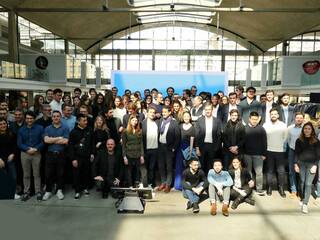All students must write a research thesis (20 ECTS)

Digital Business Specialization Master in Management Digital Business Specialization Master in Management
This specialization will equip students with all the necessary tools to lead tomorrow’s challenges in the digital economy.

HEC – 42 Start-Up Launchpad
Each March at Station F, after condensing months of research, analysis and creative thinking into a 3-minute pitch, teams present their start-up ideas to a jury. This is Launchpad, where ideas are launched..
Learn moreThe digital revolution and Big Data have a substantial effect on strategy, organization, management, innovation, consumer behavior, marketing, customer relations, logistics, and on the economy and society as a whole. As the economy is being revolutionized by the digital transformation, new stakeholders are emerging and are discovering new ways of doing business.
Our changing world has rarely been so full of opportunities for those willing to seize them. New opportunities are being created in entrepreneurship at the heart of young innovative businesses, as well as in consulting and in large companies. Whatever their career path, the digital economy is finally allowing fresh graduates to create, innovate, catalyze and direct their plans.
2 tracks are available:
Students will not be trained for a specific profession, but will rather be given the means to pursue their own career paths.
The approach in this curriculum is transversal and addresses many different areas: strategy, economics, marketing, retail, entrepreneurship, finance, logistics, etc. The purpose of such a broad education is to give students the chance to discover and experiment many different situations before starting their career.
The specialization is mainly focused on the following themes:
- Entrepreneurship (launching of start ups)
- Project management in starts ups and/or technology firms
- Digital transformation within large businesses and in consulting
This means that the specialization trains “Digital entrepreneurs’ and “Digital Innovators” – who create, innovate and develop new businesses models within startups and established companies – as well as “Digital Managers” whose expertise allows them to be successful either in large companies or within consulting firms.
‘Learning by doing’ is central to the program’s teaching.
The program is made up of several in-depth conceptual classes, which teaches students to rationalize, develop reasonable strategies take a critical stance with regards to different trends. Classes in Internet economics, strategy, internet law and the likes follow the tradition of academic excellence at HEC.
The other lessons are heavily oriented towards practice and action which takes the form of theme-based challenges. For example, the Digital Consumer challenge entails working with a company (Coca-Cola in 2015) on the best way to integrate technology into their distribution strategy and customer experience at the point of sale. To help students complete the challenge, it was supplemented by classes focusing on communication strategy, digital brand strategy, digital communication, media landscapes and digital retail.
Certain aspects of the program are designed to enable learning from practice. In the big case study at the start of the academic year, the introduction to code is somewhat similar to a hackathon, as students get to work on challenges with programmers and designers. This is one of many opportunities to learn from doing.
The Digital Entrepreneurship track, the Startup Launchpad, is designed for students who want to create their own startups.
The Launchpad supports the early stages of building an innovative startup thanks to its "learning by doing" methodology and ecosystem. Students are encouraged to partner with other students from HEC, partner schools, or even external participants to create a team with complementary and strong skills. This specialization is not an academic exercise but aims to create a real startup. The goal at the end of the program is clear: teams start their business, sign their first clients, and may even raise funds
First semester (September-January)
Opening Case Study (1 ECTS)
The program begins with a full time, week long challenge. For students, who are split into competing groups, this entails responding to a digital issue faced by a company. At the end of this week, students present their recommendations before the company’s management team and, immediately after, the best two teams redo the same representation before the company directors and marketing team.
Numerical Strategy (2 ECTS)
The classes aim to teach students how to create value in a numerical and electronic world. They study the impact of technology on market trends, business model transformation, strategic marketing, distribution, communication and business structure.
Internet and Telecom Economics (2 ECTS)
Strategic Marketing and Business Models of the Digital Age (2 ECTS)
Economic models of traditional businesses can be profoundly impacted by technology: new production processes, change in consumer behavior, new types of competition and the questioning of traditional economic models. These classes examine these changes around the marketing prism, competitive strategy, economic and data modeling in order to develop new models.
First semester (September-January)
Digital Marketing (4 ECTS)
- SEO and SEM
- CRM
- Display, retargeting and other digital marketing tools
- Apps
Social Media Management (2 ECTS)
This module examines the social media landscape and its evolution, its effects – positive and negative – on marketing policy and brand image, and introduces the different policies to manage brand presence online, and customer engagement.
The e-commerce Challenge (3 ECTS)
This challenge focuses on e-commerce strategies in a multi-channel context.
Students are briefed on an e-commerce issue faced by a company. They are required to draw up an e-commerce policy which involves either designing their own sales website, or improving one that already exists. They should include recommendations in their proposition that are related to traffic management and, where necessary, social media activity.
This module exists to facilitate the identification of business opportunities and a better understanding of the principles of and decisive factors in e-commerce.
This challenge builds on the classes in traffic generation and social media and includes interventions on:
- Trends, best practices and e-commerce solutions (David Mendez)
- Conversion optimization (Raphael Fétique)
Digital Consumer Challenge (3 ECTS)
Business is greatly impacted by the multi-channel and the emergence of the multi-channel consumer: the consumer who passes from one channel to another during the same buying process. The modern consumer lives in a continuum between the digital, the non-digital, and traditional sales and communication channels.
This challenge addresses the fundamental themes of digital retail (the integration of technology in traditional distribution channels) and online communication by focusing on new buying processes and the multi-channel consumer experience.
In 2016, for example, the students worked with the Coca-Cola Company on the integration of technology in their distribution and communication strategies in order to increase sales and optimize the client experience at point of sale. This challenge is accompanied by interventions in digital communication and online brand strategy.
First Semester (September-January)
Big Data/ Big Business (1 ECTS)
Data controls the world and a growing number of business activities. The objective of this class is to clarify the Big Data concept, to study its fundamental aspects and delve into its potential application, today and tomorrow.
Big Data Challenge (2 ECTS)
This challenge focuses on the potential impact of big data on commercial economic activity and policy. It is organized around a subject that groups are briefed on. They must then work on this theme, in terms of both its strategic aspects and possible achievement.
For example, class of 2016 students worked on the following theme: “What value can Big Data add to regulated professions’/ knowledge workers’ old models?”
Connected Objects Challenge (2 ECTS)
Online items is one of the main sources of exponential development of the web. By 2025, 150 billion objects will be connected on the web for different purposes including surveillance, home automation, online healthcare and the ‘quantified self’, measuring human activity…
Students are directed, in groups, to work with businesses on connected object usage in these different fields.
First Semester (September-January)
Introduction to Coding - Born2code (3 ECTS)
This series involves animating a programming competition. This introduction to coding is designed to help them understand how programming works and/or improve their programming skills.
E-reputation, Crisis Management and Economic Intelligence (2 ECTS)
As noted by Warren Buffett, “It takes 20 years to build a reputation and 5 minutes to ruin it. If you think about that, you’ll do things different”.
Damaging a reputation affects people and their ‘digital personality’, but also the company and brands. Their image and integrity are potentially subject to devastating attacks. Through real cases, this module helps students better understand issues regarding reputation and crisis management in the digital era.
New Digital Economy Law (2 ECTS)
Management of a web site, communication and online trails are linked to a very strict legal framework. Internet legislation is the same for all online stakeholders, big or small. This module will teach you the basics in order to grasp various legal issues linked to online activity.
Second semester (February-March)
For 8 weeks from February to early April, students work in pairs to complete a consulting project in rotation with a business (4 weeks on the project/ a week of transition spent on campus/ then another 4 weeks).
This project could focus on one of multiple subjects related to e-commerce. Its purpose and contract are clearly defined: they really are consulting projects and not an internship.
These projects are the outcome of a joint effort between academic staff and large companies or partner startups such as AXA, BlaBlaCar, Cap Gemini, Carrefour, Converteo, Criteo, Dassault, delamaison.com, Fifty-five, Hermès, Lagardère Active, L’Oréal, LVMH, Orange, Safran, Sarenza, Philips, vente-privee.com, etc.
The projects are assigned to students according to their expressed areas of interest. Each group is followed and supervised by an HEC professor.
Certain assignments involving the development of a new activity for a business have a particular structure. The teams are integrated into the Digital Entrepreneur course: not to launch a startup, but to launch their ‘client’s’ new activity.
Project examples:
- How can Orange avail of its mobile telephone client base in order to increase the traffic and usage of its online homepage?
- Studying Lagardère’s strategy development on the gambling and online gaming market.
- Creating a real estate platform at AXA (One of the two students was hired by AXA to manage and launch the project).
- Studying the launch of a Web improvement consultancy firm (the student was hired by the founding members of the team that has now become Fifty-Five).
- Writing up the development assessment for ‘vente-privee.com’ in the United States and recommending the best approaches and procedures (one of the students was recruited by vente-privee.com for their high potential program).
(15 ECTS)
Second semester (January - April)
The Launchpad isn’t a course in entrepreneurship but a true springboard for launching a startup. It aims to support the initial stages of creating an innovative startup that meets a real market need, with a solid MVP (minimum viable product) and business plan. Selected teams are guided and advised throughout the program by mentors, experts, coaches, and more, and regularly pitch before investor panels. They also participate in a learning expedition to London to meet successful entrepreneurs and have the opportunity to pitch at the London Grand Pitch Night in front of UK investors.
(15 ECTS)
Find out more here
The study trip takes place in April. In 2003, the students went to MIT and on the East coast of the United States. In 2004 they went to San Francisco, in 2006 to China, and to Japan every year since 2007. In 2016, a trip to New York has been planned for the Digital Managers, and London for the Digital Entrepreneurs.